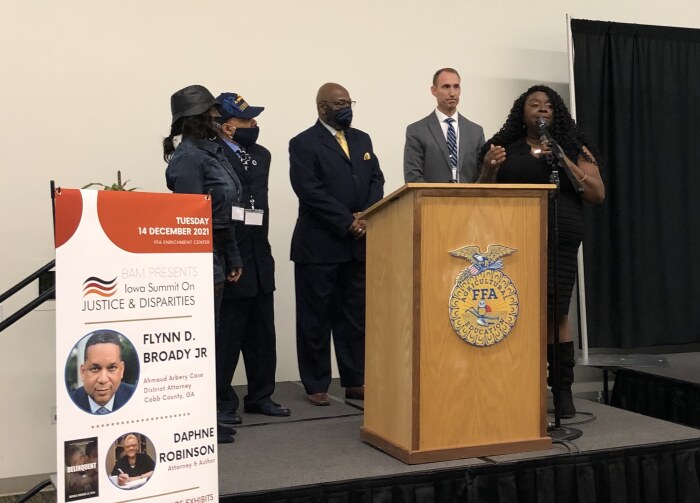Iowa Supreme Court Chief Justice Susan Christensen is forming a task force to undertake a “holistic and comprehensive” review of the juvenile justice system, Iowa’s Director of Juvenile Court Services Chad Jensen announced on December 14.
Speaking at the annual Summit on Justice and Disparities in Ankeny, Jensen explained that Iowa’s juvenile justice system is decentralized among multiple entities and governmental agencies. Some stakeholders have introduced “courageous initiatives” to improve the system in recent years. “While good intentioned,” he added, those programs and services “do have ramifications throughout the entire system.”
The task force will “review the alignment, governance structure, and the funding of Iowa’s juvenile justice system.” Members will also attempt to identify “decision points” that fuel racial, ethnic, or gender disparities for Iowa youth, and develop proposals to improve those outcomes.
The chief justice and Jensen will co-chair the task force. Others represented will include juvenile judges, juvenile court officers, the Iowa Department of Human Services, the Iowa Department of Corrections, the Iowa Department of Education, the Iowa Department of Human Rights, state legislators, county attorneys, the State Public Defender’s Office, the Juvenile Justice Advisory Council (whose members are appointed by the governor), the NAACP, family representatives, service providers, and “youth who have been touched by the juvenile justice system and have really meaningful and relevant lived experiences.”
Jensen described the following timeline:
- January 26, 2022: kickoff summit in Des Moines
- February to July 2022: six working groups will meet to focus on issues including community-based services, congregate care, training school, transition to re-entry, dual-system youth, governance, funding, and data collection
- August 2022: another summit to review and approve the working groups’ recommendations
- November 2022: publication of final task force report
That time frame would allow for recommendations to be considered during the 2023 legislative session.
When introducing Jensen, Iowa-Nebraska NAACP President Betty Andrews said the NAACP has raised concerns about the juvenile justice system as part of their advocacy with Chief Justice Christensen. Andrews noted that Iowa has the highest rate of juvenile detention of Black youth in the country. She described the situation as a “crisis.”
The Sentencing Project’s report Black Disparities in Youth Incarceration, released this summer, showed that Iowa’s Black youth placement rate was 721 per 100,000 population in 2019, the highest rate of juvenile detention in the 36 states studied. That was more than double the national Black youth placement rate of 315 per 100,000 population.
Speaking to Iowa Public Radio’s Grant Gerlock, Andrews said, “Studies show that having an experience with the juvenile justice system exponentially increases the risk for being involved in the criminal justice system as people become adults.” Iowa has long been one of the worst states in the country in terms of racial disparities in its incarcerated population.
UPDATE: The chief justice signed the order creating the task force on December 15.
Video of the December 14 announcement (filmed by Laura Belin):
Top image: Iowa-Nebraska NAACP President Betty Andrews (right) introduces Iowa’s Director of Juvenile Court Services Chad Jensen (second from right) during the Summit on Justice and Disparities. Also on stage, from left: LaTanya Graves (president of the Black Hawk County NAACP), Dedric Doolin (president of the Cedar Rapids NAACP), and Michael Guster (president of the Davenport NAACP).


1 Comment
Involve activists
This Task Force needs to include voices from the activist community. Specifically, Black Lives Matter. These optics are excellent if the public is unaware of the perpetuation of white supremacy this branch of NAACP is involved in. President Guster is active in stating that “Black on Black crime” is a reason for high youth incarceration. Additionally, he uses his position in many “white” committees to assert paternalistic viewpoints, such as condemning Black parents for not being involved with their children. His assertion that Black children are car thieves in Davenport represents a significant truth imbalance. Ms. Andrews is aware of this misrepresentation of the Black community and has not intervened. This should raise red flags. Hiding behind the NAACP caption are untrustworthy leaders at the helm of youth justice. It is unclear if we can trust that our kids finally matter.
These “studies” are not new, however the NAACP’s involvement is. Perhaps it’s too little, too late. Our children need representatives at the table who can speak untainted by assimilation and optics. Oppression is powerful enough to inhibit sight to even those who are oppressed.
It is my true wish this works, but as a Black parent of Black teenagers, I remain unhopeful.
Athena Gilbraith Wed 15 Dec 5:41 AM